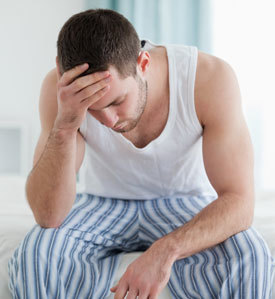
Prostatitis (lat. Prostatitis) – inflammation (swelling) of the prostate tissue.
The name of the disease comes from the words "prostate" (the prostate gland) + "itis" (inflammation).
The prostate gland (prostate) — this is a male body, therefore, the disease of the prostate refers to the male disease. The prostate gland is a small, iron-a muscular organ located in the pelvis below the bladder, in such a way that it covers the beginning of the division of the urethra (the urethra). When the prostate is swollen, pinched the urethra, therefore, by creating man the problem with urination is the main symptom of the presence of the men of the prostatitis. In the example photo:
The function of the prostate gland (prostate) – the development of a special secret that, by mixing with the seminal fluid, supports the activity of sperm, as well as its resistance to adverse conditions.
According to the statistics, at this time (2015), prostatitis sick, almost half of the men of all the Earth, in general, the age of 20 years to 50 years.
The symptoms of prostatitis
Prostatitis in men is accompanied by symptoms. Below we analyse the main of them, as well as those who manifest acute and chronic prostatitis.
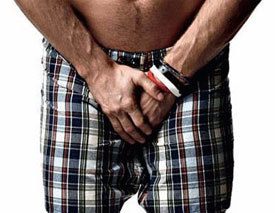
The main symptoms of prostatitis:
- disorder of urination;
- pain in the lower abdomen, scrotum, and perineum;
- disorder of sexual function (sexual dysfunction)
- problems with ejaculation;
- change in the quantity and quality of the ejaculate (semen).
Symptoms of acute prostatitis (the First symptoms of prostatitis):
- the increase of the temperature of the body prior to 39-40°C;
- headaches;
- chills, fever;
- the muscle aches and back;
- pain in the joints;
- the feeling of discomfort (swelling and heat) in the area of the crotch;
- painful touching the crotch;
- - frequent need to urinate frequent impulses;
- pain when urinating, burning when you urinate;
- increase in turbidity of the urine;
- blood in the urine;
- the selection of the urethra.
Symptoms of chronic prostatitis
The chronic prostatitis is different from acute, long and persistent of the disease, and often without clear clinical symptoms.
The symptoms of chronic prostatitis:
- fever;
- the pain between scrotum and anus;
- pain in the lower back;
- cystitis, especially recurrent cystitis.
The complications of prostatitis
If the symptoms of prostatitis do not pay due attention and not to consult a doctor, the following problems may occur:
- the development of male infertility;
- vesiculitis (inflammation of seminal vesicle of bubbles);
- epididymitis (inflammation of the testicles and their appendages);
- the transition of the disease from the acute form of chronic;
- the narrowing and scarring of the urethra;
- the obstruction of the bladder with acute urinary retention that required surgical treatment;
- a sharp pain in the crotch;
- frequent cystitis;
- abscess (pus) in the prostate, which requires surgical intervention;
- pyelonephritis and other kidney damage;
- sepsis.
The cause of prostatitis

We will now examine the main causes of prostatitis.
- sexually transmitted infection) – chlamydia, herpes virus, trichomonas, Ureaplasma, mycoplasma, cytomegalovirus, the gonococcus, the fungus of the species candida (also called yeast), escherichia coli (Escherichia coli), enterococci, and others may affect the urethra and to detect in the prostate tissue;
- an inactive and sedentary life;
- the violation of the blood and lymph circulation in the pelvic organs;
- much of the sexual abstinence, as well as the cessation of sexual intercourse or artificial prolongation of the sexual act;
- stress: mental disorders and physical overload;
- frequent the supercooling of the organism;
- the breach in the functioning of the immune system;
- the deficit of vitamins (avitaminosis) and micronutrient;
- the hormonal imbalance;
- the violation of the allergic condition.
Types of prostatitis
In accordance with the criteria of the National Institute of Health (NIH, USA), 1995, distinguishes four categories of prostatitis:
- Category I — Acute prostatitis;
- Category II — Chronic a bacterial prostatitis;
- Category III — Chronic prostatitis / syndrome of chronic pelvic pain (CP / CPPS):
- Category IIIa — Chronic prostatitis / syndrome of chronic pelvic pain, with signs of inflammation;
- Category IIIb — Chronic prostatitis / syndrome of chronic pelvic pain, without signs of inflammation;
- Category IV — Asimptomaticheskiy (asymptomatic) chronic prostatitis.
Once in a while appears to be not mentioned in this classification chronic granulomatous prostatitis.
In turn, the majority of practitioners are distinguished:
By the power of the disease:
- acute prostatitis;
- chronic prostatitis;
Depending on the causes of the disease:
- the bacterial prostatitis;
- non-bacterial prostatitis
In the majority of cases (especially in men up to 40 years) indicate that the bacterial prostatitis.
On this basis, a distinction is made between:
- acute bacterial prostatitis;
- chronic a bacterial prostatitis;
- chronic nonbacterial prostatitis.
The diagnosis of prostatitis
The diagnosis of prostatitis was established by the medical staff of the inspection. Exam:
- is performed the digital rectal exam of the prostate;
- the decision of the secretion of the prostate;
- the analysis of blood and urine;
- take tests for sexually transmitted infections;
- Ultrasonography (ultrasound) or TRUS (transrectal ultrasound);
- uroflowmetry, the monitoring of the circadian rhythm of urinary
- the seeding of the urine and from the secretion of the prostate with the definition of the sensitivity of the flora to the various antimicrobials;
- the biopsy of the prostate gland (if necessary).
When the diagnosis is important to make sure that the symptoms are not caused by urethritis (inflammation of the urethra), or of other diseases that can lead to an infection of the bladder or of the kidneys.
The treatment of prostatitis
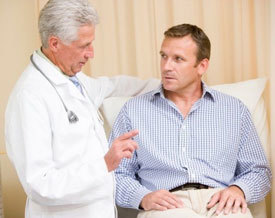
The treatment of the prostatitis may begin only after you accurately identify the type and forms of the disease, of which depends the successful treatment, because the treatments are different.
The patients of acute prostatitis, such as intoxication, fever, bad general condition of the un in need of emergency hospitalization and the intravenous introduction of antibiotics. Mild cases of acute prostatitis may be treated on an outpatient basis.
The treatment of prostatitis is done in the following ways:
Medical therapy
Antibiotics. Antibiotics are assigned to the bacterial (infectious) prostatitis. If the cause of disease is not bacteria and viruses, treatment with antibiotics / the not give. At the same time, with antibiotics can cure almost all acute infections. The selection of antibiotics for acute prostatitis should be based on the results of determining the type of organism causing the infection and the individual sensitivity to antibiotics.
To relieve the chronic pain in the area of the crotch and pelvis are prescribed alpha-blockers and muscle relaxants.
The alpha-blockers and anti-spasmodic also relax the muscles of the prostate and bladder, which helps to improve urine flow and reduce symptoms.
To remove the protector from the tension of the muscles of the pelvic floor, reduce the pressure and inflammation of the prostate, as well as to reduce the pain can be assigned muscle-relaxing tool.
Serious the patient is assigned to intravenous fluids and the mapping of diuretics, which causes copious urine, and as a consequence – profilaktirujut the intoxication of the organism, as well as the development of ascending urinary tract infection (cystitis, pyelonephritis).
For the relief of symptoms of non-bacterial prostatitis are prescribed analgesics, antipyretics, and anticholinergic medications.
To constipation it is recommended the use of emollient laxatives type of vaseline oil.
If during the treatment for acute bacterial prostatitis symptoms have gone completely, the course of treatment, it is necessary to pass to the final, as the symptoms may disappear until the complete disappearance of the infection from the body, and if the treatment is to stop acute bacterial prostatitis can pass to a chronic form.
Later assigned to the maintenance therapy.
Maintenance therapy
Maintenance therapy with the prostatitis includes:
- peace;
- the bed rest;
- drink plenty (at least 8 glasses of water a day);
- sitting in hot baths;
- soft seat as needed.
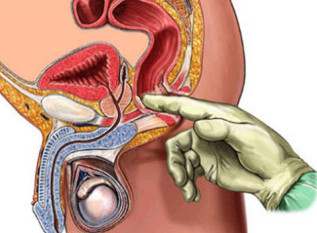
Prostate massage (prostate). When the chronic prostatitis is assigned to a regular massage the prostate gland, which is the most effective means of prostatitis.
Of the diet. Some patients during the treatment of prostatitis is assigned to the diet: the exclusion of spicy and fatty foods, acidic drinks and caffeine.
The effect it produces in the treatment of prostatitis affect and regulate ejaculation, which can facilitate the drainage of secretions from the prostate.
Patients with acute urinary retention shows the overlay temporary suprapubic fistula, or intermittent catheterization of the bladder.
When the treatment of prostatitis, you must refrain from riding a bike, frequent seat in solid surfaces and cold.
The surgical intervention
The surgical treatment of the prostatitis are allocated only in the case that the treatment has not produced the desired results, as well as in the case, when the prostate is blocking the flow of urine. In addition, the surgical intervention, in this case, is not assigned to the young, as it can lead to male infertility.
Surgery distinguishes the following forms of treatment of prostatitis:
Transurethral resection of the prostate – removal of all infected tissues.
Prostatectomy — surgery to remove the prostate, surrounding tissues, including the seed of the bubbles. This operation can cause more impotence and incontinence of the patient.
The treatment of prostatitis remedies
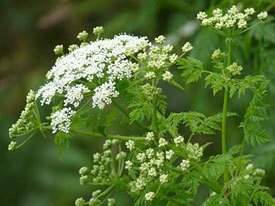
The treatment of prostatitis at home remedies gives the patient the opportunity to go to a doctor, but this is not always justified, since if the cause of the inflammation of the prostate is infection, treat it independently is unlikely to be successful. However, the grandmothers and grandfathers we have reached the following folk remedies for prostatitis:
Pumpkin seeds (white seeds). White seeds of the prostatitis was used in the ancient times, when the word "doctor" which replaced "witch". Pumpkin seeds have lots of zinc, which is essential for any man for the health android of the urinary system. For the treatment, simply due to the food, in the night to eat 30 seeds.
It can also be used in the following manner: 500 g of fried white clean the seeds from the peel and loop in a meat grinder. Add 200 g of honey and mix well. Right of the tool balls, the size of a walnut. The data of the balls you must take 1 unit 30 minutes before the intake of food, the dissolution of 2 to 3 minutes, 1-2 times a day. The required remedy in the refrigerator, but before the reception, half an hour remove from the fridge so that they are at room temperature.
Leshchina (hazelnut). 1 soup spoon of leaves or bark of hazel brewing in a glass of boiling water (close to the glass 30 minutes of a tight-fitting lid). After that the tool strain and take ¼ cup of aza of 4 per day. The brewing of beer can be alternatively, it is the bark, the leaves. The course is 1-2 weeks.
The quaking aspen. In the second half of April, when the aspen occurs sokodvizhenie, before the beginning of blooming of kidneys and the leaves of the tree, we collect the crust, the thickness of 3-5 mm on, the dry crust in the oven or in the shade. After podsushki, take 100 g of bark, a little of your mash and place it on the floor-a litre to the bank. Bark pour 200 g of vodka, but so is covered chopped the bark. Close the lid of the jar and place your infusion in a dark place for 2 weeks. Following tool strain and take before meals 3 times a day, dilute 20 drops of the tincture ¼ cup of water.
Brown. The chestnut, like his shell is exceptional not only with prostatitis, but and the adenoma of prostate. For the preparation of medicinal of the tools to use the shell with the spines, which must be the brewing and drinking instead of tea. Also from this mix you can do microclysters, 250 ml 2 times a week.
To prepare the tool from the horse chestnut, it is necessary to peel them, while the brown because of brown color. In the glass grinding. 3 tablespoons of shredded bark, filling 600 g of boiling water at night. Then strain the tool and turned up to 200 g in a water bath. Using this tool, you must on an empty stomach, 3 times per day for 30 drops. The course of treatment – until the completion of the tool. Then, you have to do 2 months of rest and repeat the course. To do 3 courses of treatment.
Propolis (clay). The propolis used for the treatment of chronic prostatitis, since this bee product is a potent anti-inflammatory and spazmoliticheskim medium. It can also be used in an integrated way with medications for the prostate.
For the preparation of the tools of 20 g of propolis to evaporate in 200 ml of alcohol. After that, 0.1 g of received from the tool mixing with 2 g of cocoa butter. Tool then a candle is inserted at night into the rectum. The course of treatment is 1 month, then a break of 4 to 6 weeks and the course repeated.
The sails of the test. To prepare the candles of the prostatitis of the test in 3 tablespoons of rye flour add a teaspoon of honey and eggs. All mix and make this test fine candles, not more than 1 cm in diameter. Fashionable candles freeze in the freezer. Frozen candles inserted into the anus in the morning and evening, preferably after the wheelchair. Course of treatment of 4 weeks, a week break and again 4 weeks.
The parsley. The parsley is a great medicinal herb, enriched with a large amount of vitamins and minerals, relieves the process of the inflammation of the prostate and restores the sexual functions of the body.
For the treatment of prostatitis parsley, you will need your juice, take 1 tablespoon spoon 3 times a day, one half hour before meals. For these same purposes can be applied and the seeds of parsley, you need to grind into powder. 4 teaspoons of powder, pour 1 cup of boiling water and place the tool boil 15 minutes, after which it will immediately cool up. Take decoction of 1 tablespoon tablespoon 4-6 times a day.
The greater celandine and hemlock (hemlock – wormwood). Of half a tablespoon of each one of the herbs pour 100 g of alcohol. The tool let it stand in a dark place of 10 days. Tincture to brew and drink all the morning, half an hour before meals. For this purpose, in a vessel with water on the first day add 1 drop of tincture, on the second day of 2 drops, 3rd – 3, and so up to 30 days (drops). Hereinafter, the count in the reverse order of the reduction. The complete course is 60 days.
The juice of the asparagus. For the treatment of prostatitis is ideal asparagus with beet, carrot and cucumber juices. For the required result, on the day that you want to take not less than 600 ml of juice.
The experts also point out that if the asparagus is very unpleasant and you may not drinking, not committing sexual abuse himself and give up this tool.
The juice of the berries of the elderberry. After sleep, drink a glass of water. In addition, through about 15 minutes, drink 1 tablespoon of juice of the elderberry. Drink the tool must be before the meal. Minimum of treatment is 10 days. The side effect can be the increase of the body temperature which means that it starts the healing process of the prostatitis.
The prevention of prostatitis
To prevent the emergence of prostatitis, you must follow the recommendations following professionals:
- refrain from random sexual life;
- reject alcoholic beverages, tobacco and narcotic drugs;
- use food enriched with vitamins as well as avoiding harmful food;
- keeping the immune system at the appropriate level;
- prevent hypothermia of the body;
- do sport or physical culture medicinal;
- do not adjust the sexual act;
- do not allow long of overdrive without culminating with the premature ejaculation.


























